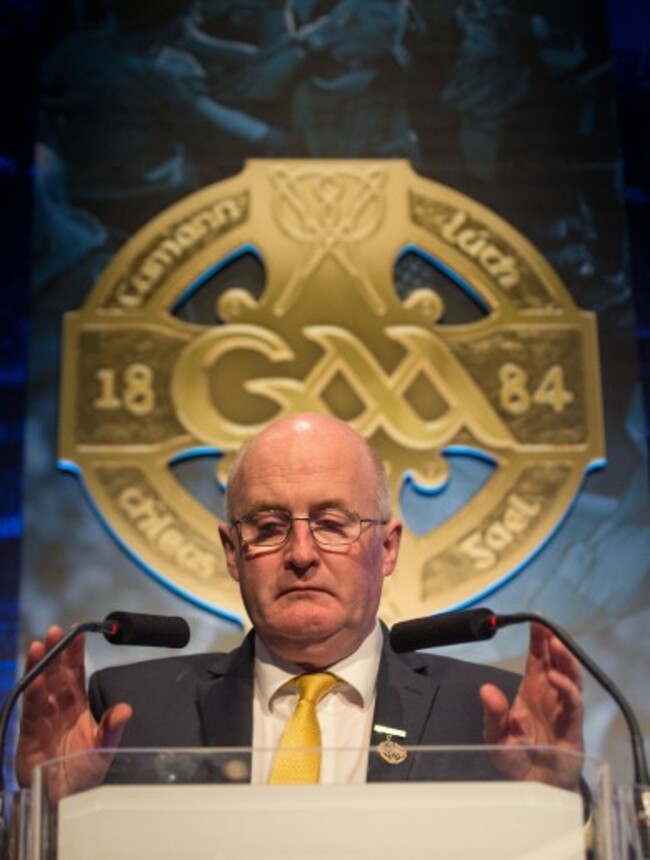GAA PRESIDENT JOHN Horan says he can’t see Gaelic games being played at any level while social distancing in its current form remains in place.
During a sobering interview with Des Cahill on The Sunday Game, Horan stressed that the safety of GAA members and their families will continue to take precedence over a return to action of any kind, including collective training, while revealing that the organisation as a whole could stand to lose €50 million of budgeted revenue in 2020 if inter-county championships and other competitions don’t take place on rescheduled dates.
Horan admitted that the GAA were taken by surprise by last Friday’s government roadmap announcement wherein it was confirmed sports facilities could reopen to groups of four, and non-contact collective training could be reintroduced on 9 June.
He indicated, however, that the GAA will not make such allowances while there remains such a national emphasis on social distancing, a decision which he said was made in large part in the interest of club volunteers. As such, there will be no on-field collective training activity of any kind until 20 July at the earliest.
“If social distancing is a priority to deal with this pandemic, I don’t know how we can play a contact sport — and that is what Gaelic games is: a contact sport,” Horan said.
“I think everyone was taken by surprise on Friday night because no one knew what was coming. It did give everyone a bit of an uplift to feel that we were coming back.
We had to examine it and look at it closely, and there was a concept in it that people had to gather together in groups of four, but we felt that it couldn’t be marshalled by people in our clubs because our clubs are led by a load of good-quality volunteer people and to put the onus on volunteer people to make the decisions to police and organise training within our facilities, we just felt that would be too much on them.
“You would have a group of four here, and there, and all of a sudden you would have a full squad gathering. Then, the next thing, after a period of that training, they’d probably push on and you could have a training behind closed doors.
“I’m not going to pass that responsibility onto the club volunteer who does a great job for us to make the decisions. Professional sport is in a different league because they don’t go back into work and can be cocooned in a family situation. We can’t do that and won’t. I think people’s health and safety is the key to it all,” he added.
“We took our time, consulted with our county chairmen and management committee before we came out with our press release on Wednesday. I think we have taken the right decision.
We’ll be taking our information from the health authorities to see is it safe, and it’s only if and when it’s safe that we will actually allow training and our games to recommence.
“Taking that information on board, then, we’ll make that decision — and we won’t bring it up to the line. We’ll be making that decision on a constant; we’re on executive calls every day and we’ll keep reviewing and updating so we’ll be staying on top of things in the next period of weeks.
“Ultimately there is a huge responsibility to get this right and if one club, be it a playing area or whatever, developed into a cluster for the COVID-19, that would be a very bad day’s work on our behalf, and that’s one thing we are very conscious of: that none of our facilities develop into a cluster.
Our concern has to be the players on the pitch, their families and their work colleagues. They are all amateurs and it’s a hobby to them all, and I know they take it to a very serious level and they have a very professional approach to it, but we can’t risk anything. I would hate to think as an organisation that we would have made a decision that would have cost any family a member of their family.
Horan confirmed that if the GAA does resume this year, the club season is likely to do so before its inter-county equivalent due to the fact that it pertains to far more GAA members. He added that in such an instance, there will likely be no club championships at juvenile age grades up as far as Minor, with leagues and other non-competitive fixtures being prioritised for young players.
“We’re quite comfortable to say that we are going to go with the club game first because it impacts on the greater number of people,” Horan said.
98% of our games are clubs games so if we play club games, it’s inclusive of everybody because the county players would get the opportunity to play with their clubs and that would have an important impact across the whole of Irish society.
“Then we can actually make the decision to return to the inter-county game. It’s a contact sport decision that is going to influence it so whether at county or club level I don’t see a major distinction between the two of them but the impact throughout the organisation would be far greater if we actually got the clubs back.”
The Dubliner also admitted that he does not personally foresee behind-closed-doors inter-county championships taking place in 2020, expressing his belief that a resumption of on-field contact might indeed follow permission for measured public gatherings to reassemble, and not precede it.
“I have an issue about the ‘closed-doors’ concept because if it is safe enough for the players to be in close contact on the pitch, it’s going to be safe enough to have a certain number of people in a gathering at the ground itself. We’re fortunate as an organisation to have such fantastic stadia.
“Take Croke Park, 83,000 is the normal attendance, I’m sure we could put an attendance into Croke Park that could be done in a safe manner. Crowds gathering in that situation will probably come before we have contact sport.
Horan told The Sunday Game that the 2020 Allianz Leagues are now highly unlikely to be completed as was previously planned, and earmarked January and February of 2021 as the latest possible point to conclude a rescheduled 2020 championships; if they were to be pushed back any further, the GAA would likely decide to draw a line under them and commence the 2021 season, Horan said.
He also confirmed that GAA players would be covered for COVID-19 under current insurance policies, but only provided that the Association takes appropriate measures to protect players.
“Under our present policy — and I’ve checked this out — our players would be covered for COVID-19 provided we don’t do anything unsafe. That is part of our decision-making process, not to be doing anything in terms of resuming games.
“That is a factor. Going forward, I think insurance companies will probably exclude pandemics from insurance policies. As it stands up until the 31 October, if a player is involved in training or playing, they would be covered under the policy.
“But again we would have to make a very clear decision that we would have to put them in a safe environment to play games.”
On the financial impact of the pandemic, Horan admitted that Horan said the outlook was “very worrying” and that the association finds itself in “a serious situation.”
“We operate a financial profile that the money we take in, such as the €74m last year — that all gets recirculated. We don’t engage in building massive reserves as the organisation goes.
“Throughout the organisation taking into account county boards and clubs, the loss for the year for us is probably in the region of €50m,” he said.











They’ll give the ticket prices some rattle when they get back.
@Patrick Agnew: In a recession? Why would they do that?
@Johnny 5: They have to fund Dublin somehow Johnny ;)
@Mel Roberts: Change the record Mel.
@Mel Roberts: https://twitter.com/tarlynch43/status/1259564767393579009?s=08
What ya make of this Mel
@Shaun Gallagher: an embarrassment.
@Gearóid Ó Tuama: It’s unreal.
@Shaun Gallagher: Mel’s hero is a partitionist west brit. ROTFL!!!
It’s beginning to sound like Holohan is a scapegoat for all unpopular news regarding relaxing restrictions more so than a Covid 19
@Shaun Gallagher: nothing surprises me with this man any more. He’s tainted his legacy on more than one occasion since retiring
I’m a gaa person but I have no worries.they can remortgage the debt free croke park. With no money going to players I wonder how they get to 50m
@john s: bad reporting. They won’t lose €50 mill, but that much in turnover. Two completely different things.
@john s: it’s a loss of revenue of €50m, money they won’t make now
@The Upside-down Triangle: who
Spoke really well i thought. A vaccine looks like the only true fix before the Gaa can approve the resumption of collective training – never mind playing matches.It’s simply too risky for players, their families, officials and supporters.
I assume he means €50m in unearned revenue?
@EnKy: exactly. Terrible headline.
@SOCIAL DISTANCING IS ENOUGH: Sure fire way to attract the anti GAA brigade.
@EnKy: But they would have spent that money too?
Can not understand where these figures are from…is there a permanent civil service within the GAA that has to be paid.?
Meanwhile the Bundesliga is starting back in a week while it looks like we’ll have no sport until social distancing measures are lifted which could be a year away depending on when we get a vaccine
@Hugh: Might never be a vaccine Hugh
@Hugh: Spot on, Hugh. The right decision too. We’ll have sport next year hopefully.
@Hugh: starting back & the Covid numbers have increased since they eased the restrictions last week!!!!! I hope they’re not having a rethink in a few weeks.
Let’s see how GAA season ticket holders are sorted out. Will be interesting.
@sean de paore: They are being refunded, announced last week
@sean de paore: The GAA showed their true colours with this issue. More interested in covering their own a#s than looking after their loyal supporters. They weren’t long in backtracking but the damage is done. Id say plenty won’t be getting it from now on.
@Conor Houlihan: either a partial refund for this year or a discount on next years ticket.
I’m telling ya now…. Garth brooks for 2021. 3 in croke 4 in Cork… Generate some of that money back
Talking sense here. Once physical distancing remains in place there cannot be team contact sports .There will have to be a vaccine before we see physical distancing being withdrawn.
@Delta Ball: so no championship in 2021 or 2022 either?
As a Gaa man all my life, they can have it for this year anyway, I can’t see myself going to any games for the foreseeable future.
Very strange language coming from the Gaa president. News just seems to get worse & worse. Think he’s trying to back the government into a corner. As paudie use say cute hoar.
Thats a very long article, long time with a lot of utter bull being spoke about the most obvious conclusion I have ever heard.
Lads runing around the fiels snot and slithers fying, while we look on from a distance in awhh. Move on deal with it, its a game lads.
GAA will return when schools return
Never again will you see croke park full.
@Niall Cassidy: the prophet of Doom has spoken.
Will clubs have our insurance and registration money returned if no games played this year.?
I’m a titall gaa person but realistically won’t happen for any games within gaa 2p20 should be wiped out and ficus on 2921 where the hunger fir the game will be i at its best missing the games though everyweek
@Liz O Mahony: jaysus Liz lay off the drink love.
https://twitter.com/stephengleeson_/status/1259142942406606848?s=12